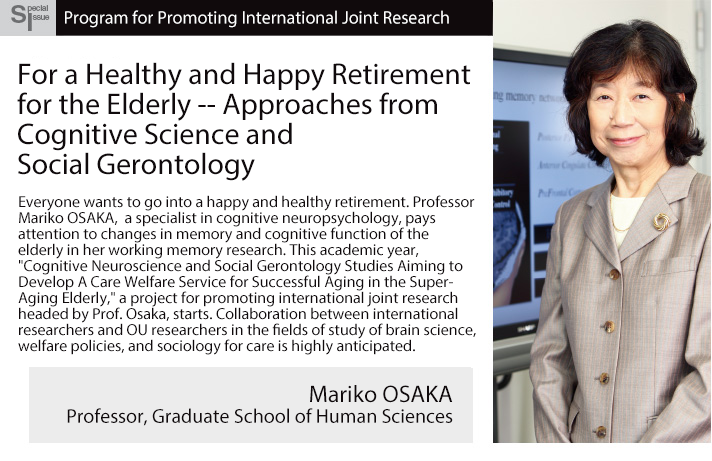For a Healthy and Happy Retirement for the Elderly -- Approaches from Cognitive Science and Social Gerontology
Mariko OSAKA, Professor, Graduate School of Human Sciences

For new nursing care services
In Japan, one in every 4 persons is 65 years of age or older. It is expected that the population further ages in developed nations. Maintaining healthy heart and mind is our common challenge. In this joint research project, researchers in brain science, cognitive psychology, geriatric psychology, and applied gerontology will research changes in cognitive function, self-respect, and sense of happiness associated with aging from their perspectives. In collaboration with researchers in welfare and sociology of care, based on verified data, the researchers intend to design concrete nursing care services for the elderly to maintain sound heart and mind.
The key to the solution is working memory
Professor Osaka studies humans' recognition process, especially working memory, a kind of notepad in the brain. Human memory has been studied from two types of memory, short-term and long-term, since the 1950s; however, there are still many things that remain unexplained. So recently, a third memory system, working memory, has drawn attention. In our daily lives, we rarely focus on just storing something in our memory. We remember certain things while performing some kind of other task; for example, we go to a supermarket keeping ingredients for dinner in mind.
Working memory is a capacity system that is capable of briefly storing and manipulating information -- talking while understanding what others say in our minds, or reading while retaining what we have read.
At Professor Osaka's laboratory, using a reading span test, working memory of a wide range of people from infants to the elderly is measured to find how it is formed and works. Such experience and methods are also used for this joint research project.
"Many people in their 40s begin to worry about their elderly parents." Professor Osaka says. She thinks that, by understanding neural mechanisms for decreased working memory and dementia, if one becomes to pay attention to important information one needs to remember and strengthen the capability of cutting back unimportant information, it will become possible for the elderly to maintain their memory in a better condition. She hopes this joint research will help the elderly maintain a healthy brain and retire in comfort.
Researchers from the U.S. and Northern Europe
Three international researchers participate in this project. Professor Hideya KOSHINO from California State University is specialized in cognitive neuroscience. He and Professor Osaka started joint research on working memory in 2008. Professor Victor Pestoff from Ersta Skondal University College, Sweden is a well-known social politics scholar in Northern Europe and is familiar with the development of nursing care systems. Associate Professor Daniela Jopp, University of Lausanne, Switzerland, is a female researcher of geriatric psychology. She joined the International Centenarian Consortium (its meeting was held at Osaka University in May 2014) to study a sense of happiness of the oldest-old.
As for Osaka University, from the Graduate School of Humanities and Sciences, Professor Shinichi SATO (applied gerontology), Professor Yayoi SAITO (sociology of care), Associate Professor Yasuyuki GONDO (geriatric psychology), from the Graduate School of Language and Culture, and Associate Professor Nobu ISHIGURO (social politics studies) all participate in this project.
The research project will be conducted through three major approaches. This group will study the development of cognitive neurons from a perspective of brain science, and a sense of happiness from a perspective of psychology and create models. Based on these, they will make proposals for nursing care services for maintaining a person's cognitive ability and increasing their sense of happiness.
Their active international exchange has been conducted since this spring. Researchers and graduate school students visited overseas research partners. Until the end of March 2017, they will have exchange among young researchers, lectures, workshops, and field work at nursing care facilities. By performing joint research while incorporating excellent technology and ideas from overseas, they would like to make Osaka University the center for researching the oldest-old in the future.

Projects for Promoting International Joint Research
Osaka University aims to further enhance research quality and promote the university's globalization by supporting advanced research between international researchers and OU researchers. The university supports international researchers who are involved in advanced research at their overseas research facilities and conduct joint research at Osaka University for more than a month a year. This project started in the academic year of 2013-14 and currently 22 programs are in progress. There are international joint laboratories with 22 universities and research institutes from 13 countries as of November 2014.
About Mariko OSAKA
A graduate of the Faculty of Education, Kyoto University, Professor Osaka completed her doctoral course of Educational Psychology at the Graduate School of Education in 1979. She has a doctor's degree in education and is specialized in cognitive neuropsychology. In 1985, she became an assistant professor at the School of Foreign Studies, Osaka University of Foreign Studies, and in 2001, a professor of the same school. Since 2007, she has been working as a professor at the School of Human Sciences. She also serves as a professor at The Center for Information and Neural Networks, Osaka University.
She is a member of The Science Council of Japan Section I and a director of Japan Society for Working Memory. Her publications include A Notepad in the Brain -- Working Memory , (Shin-yo-sha Publishing Ltd.) and more.
Interview held in December 2014
